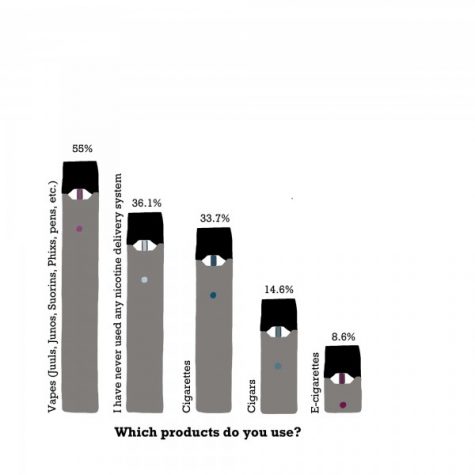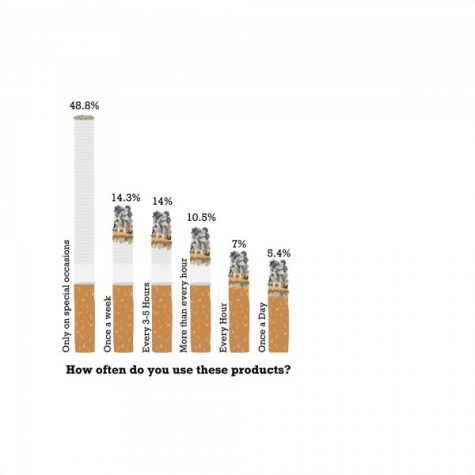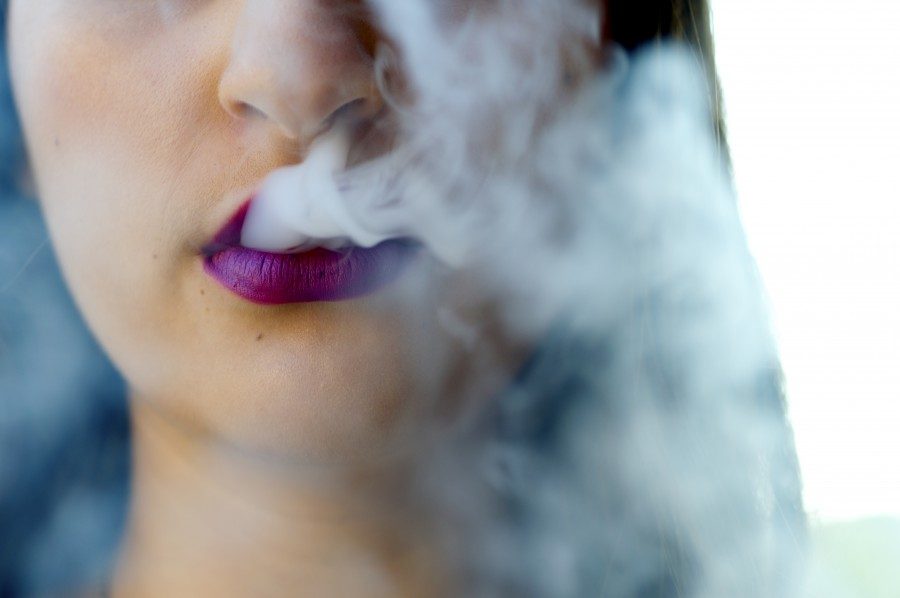Juul craze finds home at Tulane
Gwen Snyder | Senior Staff Photographer
According to an anonymous Hullabaloo survey, Juul and nicotine use is prevalent on campus.
With a quick draw of the breath, smoke begins to billow. Wisps of gray fill the air. The cloud swirls out, drifting, rolling.
In an anonymous survey conducted by The Hullabaloo, more than half of respondents admitted to vaping. Though there are many different types of these nicotine delivery systems, one brand sticks out. On Tulane’s campus, the Juul is king.
Of the 371 survey respondents, ranging across every grade and school, more than a quarter want to stop using nicotine.
“Juuls are a fucking epidemic now, not only at Tulane, but everywhere,” Tina*, a junior in the School of Liberal Arts and A.B. Freeman School of Business, said.
The “Juul Epidemic”
“I think something that really influences people to juul is not the nicotine and the idea of nicotine to start off with — it’s just the act of juuling,” Alexandra*, a freshman in the School of Liberal Arts, said. “The act of smoking … it’s an aesthetic thing, it’s a calming down thing, watching the smoke come out of your mouth.”


Juul has taken over the vape market. This year Juul Labs generated $224 million in retail sales.Daisy Rymer | Associate Artist
Additionally, it captured 32 percent market share of the total e-cigarette category and have sold one million Juul systems to date.
Juul systems are sold online for a retail price of $35, and their four-pack of pods, sold at $16 online, are easily available at convenience stores near and around Tulane’s campus. Many students said they believe Juul has become the token vape on campus.
“Obviously, [juuling is] huge while going out, but I try to hide mine because if you whip it out in public it’s like having a new pack of gum in high school; everyone tries to use it as soon as they see it,” Tina* said.
Unregulated by the FDA, Juul still manages to be the face of vaping on Tulane’s campus. Marked as a healthier alternative to smoking, it offers its customers easy access and choice with “8 delicious flavors” sold in close proximity to campus.
“Between pod dealers, The Boot Store, The Mushroom and Circle K there are always Juuls and pods for sale,” Tina* said. “Also, there’s a huge GroupMe chat for Tulane students who Juul where people will message to buy and sell Juuls and pods and to see if anyone is selling them at their specific location.”
Though it claims to be healthier, juuling is often more expensive than using cigarettes. The Boot Store sells its four-pod pack refills for $20.89 in cash and $22.03 with a card, and according to a Mushroom employee, they sell their pod packs for about $20.
“Someone who doesn’t have as much money as other people would not be able to afford a Juul habit simply because you can spend $20 in a matter of days,” Mathew*, a sophomore in the School of Liberal Arts, said. “Cigarettes — you might spend $20 over the course of two weeks, and just that simple difference makes a large difference in the choices.”
Some students favor less costly vape devices, preferring an e-cigarette because the juice, which is purchased for a similar price, lasts longer. Though the habit is costly, the culture of juuling on Tulane’s campus is still abundant. Many students said they think juuling is a commentary on the wealth and status on campus and is often a product of its “trendy” aesthetic.
https://twitter.com/sage_015/status/976145824227917824
“I think that’s why it’s so popular on campus,” Prakriti Mehta, junior and double major in cellular molecular biology and political science, said. “It’s very much like the upper-class version of smoking the same way that once upon a time people would smoke fancy cigars or cigarillos — but now it’s just juuling.”
For a variety of reasons, many students have developed a nicotine habit. Around one in eight respondents ‘agreed’ or ‘strongly agreed’ that nicotine affects their day-to-day life. Many students said they view nicotine as a social habit rather than an addictive one.
Despite 33.7 percent of survey respondents indicating they smoke cigarettes, many said they perceive a stigma around the action. The stigma may be, in part, a contributing factor to the rise of juuling on campus.
“I definitely feel like devices like juuls are a lot more accepted than cigarettes,” Alexandra* said, “I don’t really know why. For example, if I’ll light up a cigarette walking down Freret, I’ll get really embarrassed … people just get judgy a little bit.”
https://twitter.com/tbs_tulane/status/975473401983848448
Tobacco marketing and peer pressure are often accredited for youths purchasing nicotine delivery systems. Many students said they use nicotine to curb anxiety issues.
“It really is something that calms me down,” Alexandra* said, “Like how often can you say that you take 10 minutes out of your day to focus on your breathing. Like that’s kind of what smoking is for me.”
Confusions and Concerns
Since 2014, Tulane University has been a tobacco- and smoke-free campus. The policy change was unanimously passed through Tulane University senate and received official Undergraduate Student Government backing in 2014. The policy was written to include the prohibition of electronic cigarettes and vaporizers.
Violating this policy can result in a $25 fine issued by Tulane University Police Department. According to Vice President of Campus Health Scott Tims, the Health Center for Student Care will conduct a follow-up with the person reported. Many students, however, reported not always knowing where it is acceptable to smoke.
Additionally, other students said they did not even know that juuling was part of the “No Tobacco” policy.
In addition to confusion about the specifics of Tulane’s policies around tobacco use, the e-cigarette industry itself, a $3 billion industry, is still largely unregulated. Researchers and policy makers are trying to keep up with the ever changing industry but are unable to truly predict the future ramifications of vape and e-cig culture. Currently the FDA has yet to regulate Juul.
The research on long-term side effects of using a vape does not exist. The product is too new, and since there is so little positive or negative health information about juuling, some students said they feel comfortable using the devices, viewing any potential health problems as an issue for tomorrow.
“There haven’t been enough studies on the long term effects of vaping, so people just do it for the momentary rush of adrenaline without thinking about the potential damages,” sophomore Madeleine Kattan said.
Student Health and Wellness Committee members shared a number of concerns about Juul usage.
“Students should be cautious about Juul use because they are marketed specifically to young people that are not prior nicotine users,” SHAC member-at-large Allison Foster said. “Juuls, and e-cigarettes in general, are too recent of an invention for researchers and medical professionals to know the long-term effects of daily use.”
SHAC Director Eva Dils shares Foster’s worries while acknowledging the role Juuling plays on campus.
“From the studies I’ve seen, we don’t have a great understanding of the potential health effects of vaping — so for me it definitely sits in the risky behavior category,” Dils said, “In some sense, vaping serves to normalize smoking behavior more broadly, which clearly is not great. At the same time, vaping is often used as a step-down from cigarette smoking. Which is great — vaping is absolutely the lesser of two evils here … So overall, is juuling awesome? Clearly not. But is it potentially useful as a harm-reduction strategy? For sure.”
*These pseudonyms have been selected by The Hullabaloo to protect the privacy of students who prefer to remain anonymous for the reporting of this article.
Leave a Comment
Your donation will support the student journalists of Tulane University. Your contribution will allow us to purchase equipment and cover our annual website hosting costs.

















sophiarox • Apr 16, 2018 at 9:07 pm
Juuling is something that is “cool”. If you have a Juul at a party, everyone will flock. Wheres if you are dipping, you are considered a black sheep. So I do not think the data would be affected as much as you think
C T • Apr 12, 2018 at 10:47 pm
Correction: Juul and other vaping devices are currently regulated by the FDA, deemed to be regulated starting August 8th, 2016… data on retail sales and market share are also outdated.
rollwave30 • Apr 12, 2018 at 10:30 am
Why wasn’t dip/smokeless tobacco included on the survey? Would definitely impact the data.